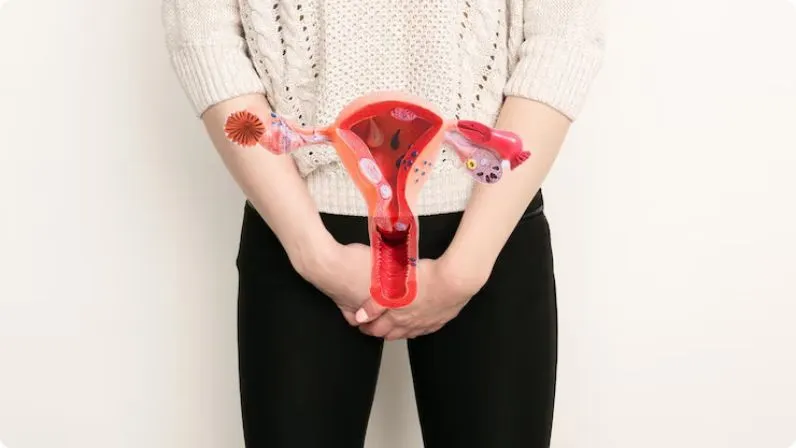Septate Uterus
At Mamata Fertility Hospital in Secunderabad, we are committed to providing personalized care and education about various reproductive health issues.
One such condition is a septate uterus, a congenital anomaly that can affect fertility and pregnancy. While this condition may sound concerning, it’s manageable with proper care and treatment.
Here’s a detailed yet easy-to-understand guide to help you learn more about septate uterus and how it can be treated effectively.
For Appointments, Please Call:
More On Septate Uterus
What is a Septate Uterus?
A septate uterus is a structural issue where the uterus is divided by a fibrous band of tissue called a septum. Unlike a normal uterus, which is pear-shaped with a single cavity, a septate uterus has two compartments, split by this extra tissue.
The condition occurs during fetal development when the structures that form the uterus fail to fuse properly. This leads to an incomplete formation of the uterine cavity.
Types of Uterine Septum
-
- Partial Septate Uterus: The septum partially divides the uterus, extending partway down the cavity.
- Complete Septate Uterus: Here, the septum divides the entire uterine cavity from top to bottom, sometimes reaching the cervix.
While a septate uterus may not always cause noticeable symptoms, it can sometimes lead to fertility challenges and pregnancy complications.

Causes and Risk Factors
A septate uterus is a congenital condition, meaning it forms in the womb before birth. There are no specific actions or environmental factors during pregnancy that cause this condition.
Causes
-
- Developmental Anomaly: The septate uterus forms when the two Müllerian ducts, which develop into the uterus, fail to fuse completely during fetal development.
- Genetics: While not always hereditary, certain genetic factors may increase the likelihood of uterine anomalies.
Risk Factors
Although the exact cause is unclear, having a family history of uterine abnormalities may increase the risk of someone being born with a septate uterus. Early diagnosis is key for proper management if complications occur.
Symptoms and Diagnosis
Many women with a septate uterus have no apparent symptoms and may remain unaware of the condition unless fertility or pregnancy issues arise. However, for some women, certain symptoms may signal this condition.
Common Symptoms
-
- Recurrent Miscarriages: The presence of a septum can make it more difficult for a fertilized egg to implant or develop properly.
- Painful Periods: Some women may experience discomfort during their menstrual cycles.
- Premature Labor: Increased risk of going into labor before the due date.
- Difficulty Conceiving: Some women with a septate uterus might face challenges in getting pregnant.
Diagnostic Tools
At Mamata Fertility Hospital, we use advanced and accurate diagnostic tools to examine and confirm the presence of a septate uterus, including:
-
- Ultrasound (3D): Provides detailed information about the shape of the uterus and identifies abnormal structures.
- Hysterosalpingography (HSG): This X-ray test involves injecting contrast dye to show the uterine cavity and fallopian tubes.
- MRI: Magnetic resonance imaging offers a clear view of uterine structures, helping to differentiate between uterine anomalies.
- Hysteroscopy: A small camera inserted into the uterus allows direct visualization and assessment of the uterine cavity.
Correct diagnosis is critical for planning appropriate care and treatment.
Impact on Fertility and Pregnancy
A septate uterus doesn’t prevent conception entirely. However, it can interfere with fertility and increase the risks associated with pregnancy. Knowing its potential effects can guide women to seek timely care.
Fertility Concerns
-
- Implantation Issues: The uterine septum is made of fibrous tissue without adequate blood supply, making it harder for a fertilized egg to implant successfully.
- Recurrent Pregnancy Loss: The restricted space within the uterus may lead to early pregnancy loss before the embryo can grow properly.
Pregnancy Risks
Women with a septate uterus may face some challenges during pregnancy, including:
-
- Miscarriage: The most common complication is repeated miscarriages, especially in the first trimester.
- Preterm Labor: A smaller and irregularly shaped uterus may result in premature labor.
- Breech Presentation: The baby may not have enough space to position itself head-down, increasing the likelihood of a breech delivery.
- Low Birth Weight: Restricted space in the uterus may affect fetal growth.
With early detection, careful monitoring, and specialized care, many of these risks can be managed effectively.
Treatment and Management Options
The treatment for a septate uterus depends on a woman’s specific condition, symptoms, and whether she is trying to conceive. At Mamata Fertility Hospital, we offer state-of-the-art treatments tailored to each patient’s needs.
Non-Surgical Management
If the septate uterus isn’t causing symptoms or complications, monitoring and non-invasive care may be all that’s needed. However, if fertility or recurrent miscarriage becomes an issue, surgical intervention may be required.
Surgical Treatment
-
- Hysteroscopic Metroplasty: This minimally invasive procedure involves removing the septum to restore a normal uterine shape. The surgery is typically done on an outpatient basis, meaning recovery is fast and easy.
- Laparoscopy-Assisted Procedures: Sometimes, laparoscopic techniques are combined with hysteroscopy for improved precision.
Post-Treatment Care
After surgery, women are usually able to conceive successfully. Follow-up with your doctor is crucial to ensure the uterus has healed properly before trying to get pregnant.
Lifestyle and Dietary Recommendations
Although a septate uterus itself cannot be prevented, maintaining a healthy lifestyle can support overall reproductive health and increase the chances of a successful pregnancy.
Nutrition Tips
-
- Increase Folic Acid Intake: Folic acid helps prevent complications during pregnancy. Foods like spinach, broccoli, and fortified cereals are excellent sources.
- Balanced Diet: Focus on a mix of lean proteins, healthy fats, and whole grains to support general well-being.
- Stay Hydrated: Drinking plenty of water keeps the body functioning smoothly and supports uterine health.
Healthy Habits
-
- Regular Exercise: Light activities like yoga or walking reduce stress and help maintain a healthy weight.
- Avoid Smoking and Alcohol: These can harm fertility and increase pregnancy risks.
- Stress Management: Try relaxation techniques like deep breathing or meditation to manage stress levels.
Adopting healthy habits benefits your reproductive system and prepares your body for pregnancy.
Frequently Asked Questions (FAQs)
1. Does a septate uterus always require surgery?
No. Women without symptoms or complications may not need surgery. It’s only recommended if fertility or pregnancy problems occur.
2. Can a septate uterus cause infertility?
Not directly, but it can make it harder for the fertilized egg to implant, leading to challenges in conception or increased risk of miscarriage.
3. How successful is surgery for a septate uterus?
Hysteroscopic surgery has a very high success rate and significantly reduces the risk of pregnancy complications in most women.
4. Can a woman with a septate uterus have a normal pregnancy?
Many women with a septate uterus go on to have healthy pregnancies, particularly after the condition is diagnosed and treated appropriately.
5. How long after surgery can I try to get pregnant?
Most doctors recommend waiting 2–3 months after surgery to allow the uterus to heal completely before attempting pregnancy.
At Mamata Fertility Hospital, we understand how important your reproductive health is. Our experienced team is here to guide and support you every step of the way, from diagnosis to treatment and beyond.
If you suspect you have a septate uterus or are facing fertility challenges, contact us today to schedule a consultation and explore personalized care options. You’re not alone—we’re here to help!
Reviewd By

Dr Aarti Deenadayal Tolani
Clinical Director, Scientific In-Charge & Fertility Consultant
MBBS, MS ( OBGYN), FICOG
Expert in Reproductive Endocrinology, Infertility, Advanced Gynaec Ultrasound, and Faculty at Mamata Fertility Hospital.
Blogs and Articles

Differences Between Sterility and Infertility
Infertility is difficulty conceiving, often treatable. Sterility is the permanent inability to conceive. Know the difference, seek help.

Can Yeast Infection Cause Infertility?
Yeast infections don’t cause infertility. While discomfort and changes in cervical mucus may affect conception temporarily, proper treatment resolves this.

Does Female Masturbation Cause Infertility?
Female masturbation does not cause infertility. It’s a natural, healthy activity with no impact on ovulation, implantation, or conception.

